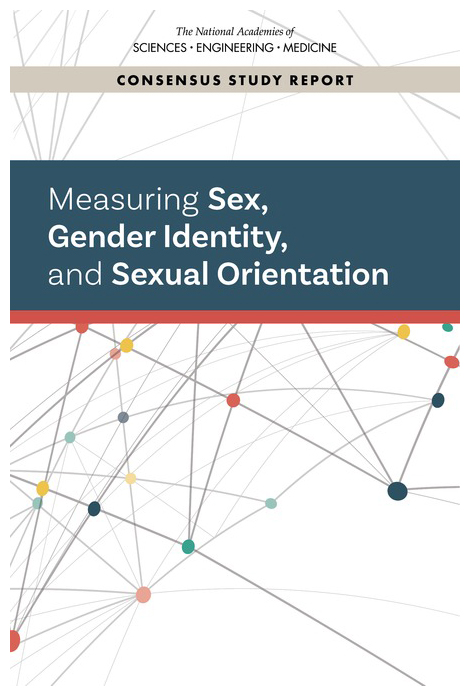
As the visibility of transgender and intersex populations increases in the public awareness, there is also a need to address the challenges of accurately understanding and communicating the complexities of sex, gender identity, and sexual orientation in research. At the request of the National Institutes of Health (NIH), a committee was established by the National Academies of Sciences, Engineering, and Medicine to study current methodologies related to sex, gender, and sexual orientation.
The resulting recently released report, Measuring Sex, Gender Identity, and Sexual Orientation, provides specific recommendations for more robust practices in collecting data on sex, gender, and sexual orientation in order to more accurately capture the complexity of these concepts and people’s experiences within the LGBTQI+ and other sex, gender, and sexual orientation minority populations.
The guiding principles detailed in the report promote accurate representation in data collection instruments, precise terminology, ability for people to self-identify, collection only of necessary data, and maintaining privacy and confidentiality.
The report advocates for standardized terminology as a foundation for data collection. Sex and gender are often merged into a single concept, which is inaccurate, non-inclusive, and does not capture the full complexity of people’s experiences and identities. The report defines several terms related to the concepts of sex and gender, including the intertribal term “Two-Spirit,” which is reserved for use by Indigenous people as an English approximation of similar but culturally specific concepts.
The report indicates that a two-step gender measure is preferred, including both the sex assigned at birth and current gender identity. It is also important to note, according to the report, that the sex assigned at birth may not accurately reflect a person’s biological sex as intersex traits often are not discovered until later in life. The report recommends a separate measure of intersex status, not simply a third option when recording sex.
While sexual orientation is a fairly widely studied concept at this point, it is dependent upon accurate representation of sex and gender identity, so data related to sexual orientation may change as standardized practices increase accuracy of all three concepts.
The full report is now available in prepublication with the final edited version coming in the near future. As researchers adopt these improved practices, the improved data quality can help the NIH and other organizations more fully understand the challenges LGBTQI+ populations face in accessing equitable treatment in health care and other areas of their lives.
Work With Us, Work for Us
Econometrica specializes in research and management across numerous industries in both the public and private sectors. We are always looking to hire the best and brightest in data science, health, grants management, energy, homeland security, housing and community development, capital markets and finance, and transportation. We work as the lead service provider, and also as a capable outsource partner to other consultancies. To work with us on your next project, visit us online and email a member of our executive staff in your preferred specialty. To explore the benefits of working for us, visit our careers page.
